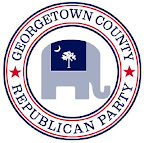Jill Kelso: Clean Elections Act
Published in the Georgetown Times- April 19, 2009
By Jill Kelso
Recently liberal Democrat State House members, including Rep. Vida Miller, introduced the "SC Clean Elections Act," a measure that would force taxpayers to pay for the election campaigns of politicians running for state offices.
Under the proposed law, candidates would agree to limit the amount of money spent on their campaign and not exceed the amount of money spent by their opponent. The bill would require the State to issue "debit cards" to candidates to pay for campaign expenses. It would also create a whole new administrative and enforcement bureaucracy.
Why would legislators want to pile the burden of paying for political campaigns on the backs of taxpayers - especially at a time when budgetary constraints are causing teachers to lose their jobs? After some research, it becomes crystal clear: Incumbent legislators want to ensure they hold their seats and are using their power to have taxpayers foot the bill.
It gets better. The legislation reads "The General Assembly finds that the current system of privately financed campaigns for election to statewide and legislative offices undermines democracy in this state."
So, a private citizen using their own money and time to support candidates of their own choice "undermines democracy?" This bill is akin to union bosses taking union dues and funding political campaigns for politicians its members don't agree with. But it's not a union it's our government. How is this democratic? How does this protect the First Amendment and the integrity of the electoral process? The answer: it doesn't.
Six states have similar legislation - Connecticut, Maine, New Mexico, North Carolina, Vermont, and Arizona. Advocates believe that special interest involvement in the election process has deterred people from running for public office. They feel that by enacting "clean" campaign laws more "everyday" people will feel compelled to run for office and that voters will feel like their votes matter more, thereby increasing turnout.
The data shows these laws have done nothing to increase the number of candidates, change special interest involvement, or increase voter turnout. In fact, data from the U.S. General Accounting Office (GAO) on Arizona's 2004 elections demonstrated that incumbent reelection rates actually rose for House seats in Arizona. And Arizona's Goldwater Institute has found that publicly financed elections in that state have failed to increase voter participation. So who is really behind this effort?
According to the John W. Pope Civitas Institute the "clean" elections movement is being led by groups "notorious for their extreme left-wing sympathies." Examples of these groups include The Open Society Institute, founded by leftist billionaire George Soros, and The Tides Foundation, which receives funding from Soros and by Theresa-Heinz Kerry, the wife of liberal U.S. Senator John Kerry. The Tides Foundation has contributed to MoveOn.org, the Arab-American Action Network, and two pro-Castro groups: United for Peace and Justice; and the Center for Constitutional Rights. Board chairman Wade Rathke is also the founder of the far-left group ACORN, and is a former activist for the socialist group Students for a Democratic Society.
Here at home, the South Carolina Progressive Network, a far left group that's pro-gay marriage, pro-abortion, and anti-right to work, is championing the Democrats' bill.
So why are Miller and the Democrats pushing for this law? Because they believe they have the right to use our money to pay for campaigns, to ensure that incumbent voting records are silenced and to minimize opposition to their seats. In short, they expect over-burdened taxpayers to pay for the campaigns of politicians, even those we may not agree with.
This legislation is nothing more and nothing less than an Incumbent Protection Act ... an obscene violation of the First Amendment and huge waste of our money. We can only hope conservatives in the State House kill this bill while it's still in committee.
